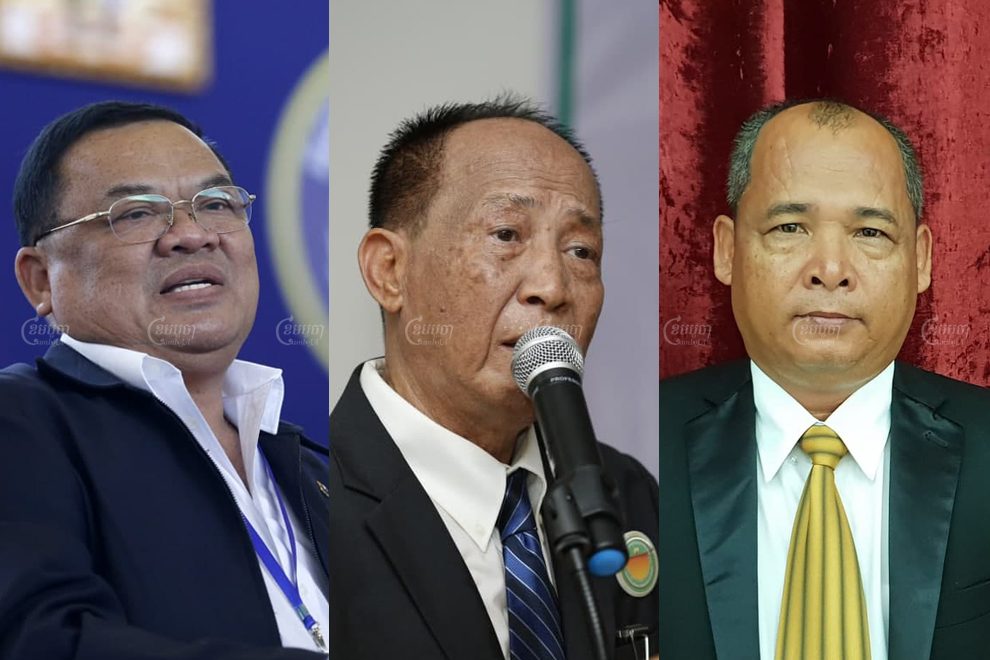Three small political parties, who won zero seats in 2018, have formed a pre-election coalition ahead of the 2022 and 2023 elections and expected their decision to contest jointly would improve their chances of winning parliamentary seats.
The Khmer National United Party, Beehive Social Democratic Party and Khmer United Party formed the “Alliance of Khmer Democrats” in October. The three minor parties plan to contest the upcoming commune and national elections as a coalition.
The alliance will be headed by Mam Sonando, who is the president of Beehive Social Democratic Party, with Nhek Bun Chhay, of the Khmer National United Party, assuming the role of deputy head and Kem Rithisith, president of Khmer United Party, working as its secretary general.
Sonando said the alliance would contest the elections on an anti-corruption platform, focusing on the exploitation of natural resources and public services.
“We want to reform a society where they have been committing systematic corruption for many decades and we are determined to settle these issues,” Sonando told CamboJA.
The politician said there was little chance of the dissolved Cambodia National Rescue Party being resurrected because Kem Sokha and Sam Rainsy had attempted to bring down the Cambodian People’s Party government.
He added the alliance had no intentions of grabbing power or aspiring for the prime ministership, but was instead focused on uniting Khmer people to tackle social injustices.
The three parties contested the 2018 election and won a combined 3.2 percent of the national vote and zero parliamentary seats. All elected seats in the Senate and National Assembly are occupied by the Cambodian People’s Party.
Mam Sonando regained the presidency of the Beehive Social Democratic Party in 2018, after resigning over the party’s poor showing at the 2017 commune election. Sonando was sentenced to 20 years in prison for an alleged secessionist plot in Kratie province and was also seen at a CNRP post-election demonstration in 2013.
Military general Nhek Bun Chhay broke away from the royalist Funcinpec political party in 2016 to form the Khmer Nation United Party. He was arrested in 2017 in relation to a 2012 drug bust and charged with conspiring to produce drugs. He was released on bail in April 2018.
The Khmer United Party was formed prior to the 2018 national election by Kem Rithisith, who is the brother of slain political commentator Kem Ley. Rithisith first wanted to name his party “Kem Ley Party” to protect his brother’s name from political exploitation but was asked to change the name by the Interior Ministry.
Rithisith said the coalition would allow for more voices and representation in parliament. He expected the three parties to contest elections jointly and put up only one list of candidates for each province.
He said that if the Khmer United Party were to contest in Kampot, Takeo and Preah Sihanouk, then the two other parties would not put up candidates in those provinces and support his party’s list.
“We have divided [the provinces] into zones to contest the elections and to support each other,” he said.
Rithisith ruled out a merger of three parties because they each had “different ideas” but admitted that it would not be easy to compete with the political dominance of the CPP.
CamboJA could not reach Nhek Bun Chhay for comment.
In 2013, the Cambodia National Rescue Party came the closest to unseating the CPP government, winning 55 of the 123 seats in parliament. The party was dissolved in 2017 after its best showing during that year’s commune election, where it won 489 commune chief positions.
After reassigning almost all commune chief positions to itself, the CPP swept all the Senate and National Assembly seats in 2018, with the number of invalid or spoiled ballots outnumbering votes by any other small party in the national election.
Pa Chanroeun, president of the Cambodian Institute for Democracy, said that while it was common for smaller entities to combine forces during elections, it was unlikely the new alliance would compete with the CPP.
“If we look at past elections, those three parties have not [garnered] enough support to win seats,” he said.
He added that the absence of the CNRP at the 2018 election did not result in a split in the opposition vote to other smaller parties and that then-opposition voters were wary of these smaller parties.
Former CNRP official Meach Sovannara said members of the new alliance did not have the credibility of the CNRP, pointing to their participation in the Supreme Council for Consultation and Recommendations.
The consultative body was created after the 2018 elections, with critics saying the powerless body was only aimed at placating smaller parties and giving them government positions.
“It is difficult for them to show the public that their alliance can become an opposition party because they are under the political control of the ruling CPP,” Sovannara said.
Sok Eysan, a spokesperson for the CPP, said that while it was good for the smaller parties to form such an alliance, he dismissed any threats to the CPP’s hold on parliament.
“They will get some ballots after forming this alliance but if they are hoping to win the election and lead the government it will not happen because they are so small,” Eysan said, who won as a CPP candidate in the 2018 Senate election.








